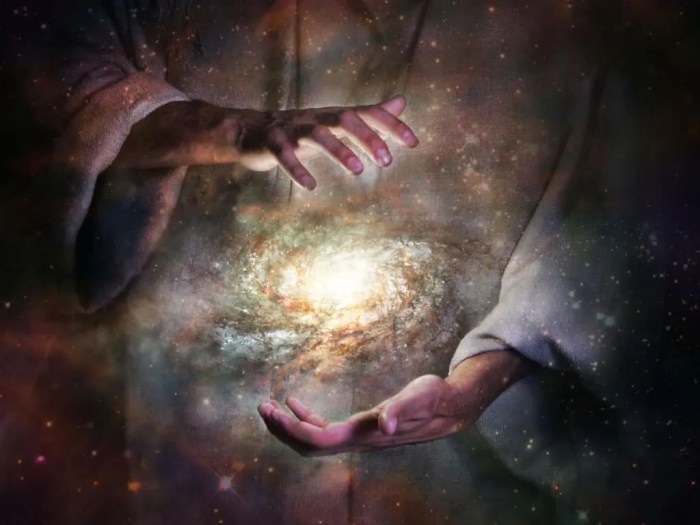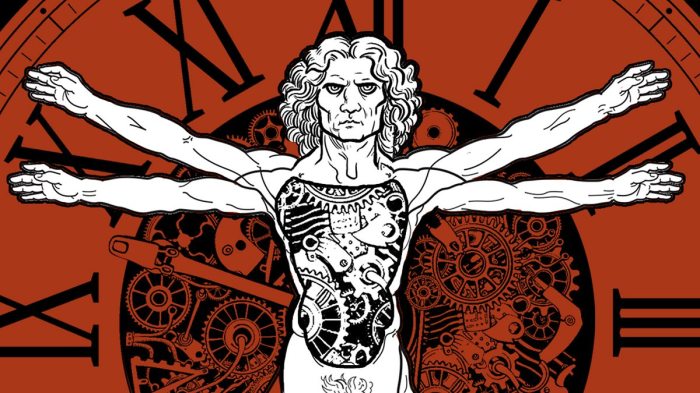Believers in a watchmaker god posit that the universe’s intricate design and fine-tuning point to the existence of a higher power. This concept has captivated philosophers and theologians for centuries, sparking a lively debate about the origins of life and the nature of reality.
Throughout history, this belief has manifested in various cultures and societies, shaping ethical and moral frameworks. From ancient Greek philosophers to modern-day scientists, the watchmaker god argument continues to inspire and challenge our understanding of the universe.
Definition of “Believers in a Watchmaker God”

The concept of a “watchmaker god” is a metaphor used to describe the belief that the universe and its intricate order are the result of a conscious and intelligent designer. This belief is often associated with theistic religions, which hold that a divine being created and sustains the world.
The origins of this belief can be traced back to ancient times, with many cultures and civilizations positing the existence of a creator deity responsible for the order and complexity of the natural world. The analogy of a watchmaker has been used since the 18th century to illustrate the idea that the universe, like a watch, exhibits signs of intelligent design and purpose.
Historical Development
The watchmaker god analogy gained prominence during the Enlightenment period, particularly through the writings of philosophers such as William Paley. Paley argued that the intricate adaptations and harmonious relationships observed in nature could not have arisen solely through random processes and must therefore have been the result of a benevolent designer.
In the 19th century, the watchmaker god concept was challenged by the theory of evolution proposed by Charles Darwin. Darwin’s theory suggested that the diversity and complexity of life on Earth could be explained through natural selection acting on random variations over long periods of time, without the need for divine intervention.
Contemporary Perspectives
Today, the watchmaker god analogy continues to be debated among scientists, philosophers, and theologians. Some proponents of intelligent design argue that the universe and its laws exhibit irreducible complexity, which cannot be explained by natural processes alone and therefore requires a designer.
However, many scientists reject the watchmaker god analogy, arguing that it is based on a false dichotomy between design and natural processes. They contend that the complexity and order observed in nature can be adequately explained through the laws of physics, chemistry, and biology, without the need to invoke a supernatural designer.
Arguments for the Existence of a Watchmaker God: Believers In A Watchmaker God

The concept of a “Watchmaker God” suggests that the universe, with its intricate order and apparent design, is the creation of an intelligent designer. This idea has been supported by various arguments, particularly those based on the complexity of the universe, its fine-tuning for life, and the argument from design.
Complexity of the Universe
The universe is vast and incredibly complex, from the tiniest subatomic particles to the largest galaxies. The laws of physics and the constants of nature are precisely tuned to allow for the formation and sustenance of complex structures, including life.
The sheer complexity of the universe, with its countless interconnected systems and processes, suggests the work of an intelligent designer who orchestrated this intricate order.
Fine-Tuning of the Universe for Life
The universe appears to be remarkably fine-tuned for the existence of life. The values of fundamental physical constants, such as the strength of the electromagnetic force or the mass of the proton, are within a narrow range that allows for the formation of stars, planets, and life as we know it.
Even slight deviations in these constants would have made the universe uninhabitable. This fine-tuning has led some to argue that it is unlikely to have occurred by chance and suggests the deliberate design of a creator.
Argument from Design
The argument from design, also known as the teleological argument, draws parallels between the universe and a watch. Just as a watch has a complex design that implies a watchmaker, so too does the universe exhibit evidence of intelligent design.
The intricate order and apparent purposefulness of the universe suggest that it was created by a designer with a specific purpose in mind.
Criticisms of the Watchmaker God Argument

The Watchmaker God Argument is not without its critics. Several key objections have been raised, including the problem of evil and suffering, the argument from ignorance, and the lack of evidence for a creator.
Problem of Evil and Suffering
One of the most common criticisms of the Watchmaker God Argument is the problem of evil and suffering. If God is all-powerful, all-knowing, and all-good, why does evil and suffering exist in the world? Critics argue that the existence of evil and suffering is incompatible with the existence of a benevolent and omnipotent God.
Argument from Ignorance
Another criticism of the Watchmaker God Argument is the argument from ignorance. Critics argue that the argument relies on the assumption that we do not know how the universe came into being. However, just because we do not know how something happened does not mean that it was caused by God.
The argument from ignorance is a logical fallacy that does not provide any evidence for the existence of God.
Lack of Evidence for a Creator
Finally, critics of the Watchmaker God Argument point to the lack of evidence for a creator. There is no scientific evidence to support the claim that the universe was created by a supernatural being. In fact, all of the evidence suggests that the universe is the result of natural processes.
Alternative Explanations for the Existence of the Universe

The Watchmaker God argument is not the only explanation for the existence of the universe. Scientists have proposed several alternative theories based on different scientific disciplines, such as cosmology, quantum mechanics, and multiverse theories.
Believers in a watchmaker god often argue that the complexity of the world is evidence of a divine creator. However, this argument ignores the existence of ableism in the deaf community , which suggests that even the most complex systems can be flawed.
After all, if a watchmaker created the world, why would they design a community where some members are marginalized due to their inability to hear?
The Big Bang Theory
The Big Bang theory is the leading scientific theory for the origin of the universe. It proposes that the universe began as a singularity, a point of infinite density and heat, about 13.8 billion years ago. This singularity then underwent a rapid expansion, known as the Big Bang, which created the universe as we know it.
Theories Based on Quantum Mechanics
Quantum mechanics is a branch of physics that deals with the behavior of matter at the atomic and subatomic level. Some theories based on quantum mechanics suggest that the universe may have originated from a quantum fluctuation, a random event that created the universe from nothing.
Multiverse Theories
Multiverse theories propose that our universe is just one of many universes that exist in a larger multiverse. According to these theories, the multiverse may be infinite in size and may contain universes with different laws of physics and different outcomes.
Cultural and Societal Implications of Belief in a Watchmaker God
The belief in a Watchmaker God has profoundly influenced cultures and societies throughout history. It has shaped ethical and moral frameworks, inspired artistic expression, and fostered a sense of purpose and meaning in human life.
Role in Different Cultures and Societies
Belief in a Watchmaker God is prevalent in many cultures, including Western Christianity, Islam, and Judaism. In these cultures, the belief serves as a foundation for moral codes and societal norms. It provides a sense of accountability to a higher power and encourages individuals to live in accordance with divine principles.
Impact on Ethics and Morality
The belief in a Watchmaker God has a significant impact on ethics and morality. It provides a framework for right and wrong based on the perceived will or commandments of God. This framework often includes virtues such as honesty, compassion, and justice, which are seen as essential for a harmonious and ethical society.
Influence on Art, Literature, and Music, Believers in a watchmaker god
The belief in a Watchmaker God has inspired countless works of art, literature, and music. From the Sistine Chapel’s iconic ceiling frescoes to the soaring cathedrals of Europe, religious art has sought to capture the grandeur and mystery of the divine.
Similarly, literature and music have explored themes of faith, doubt, and the search for meaning in a world created by God.
Personal Perspectives on Belief in a Watchmaker God

Belief in a watchmaker god is a common belief system that attributes the existence of the universe to a creator being. While there are many different variations of this belief, the central idea is that the universe is too complex and ordered to have come into existence without a divine designer.
Personal Reasons for Belief
There are many reasons why people believe in a watchmaker god. Some of the most common reasons include:*
- *The complexity of the universe. The universe is a vast and complex place, and many people believe that it is impossible for such a complex system to have come into existence without a creator.
- *The order of the universe. The universe is also a very orderly place, and many people believe that this order is evidence of a divine designer.
- *The beauty of the universe. The universe is a beautiful place, and many people believe that this beauty is evidence of a divine creator.
- *Personal experiences. Some people have had personal experiences that they believe are evidence of a divine being. These experiences may include things like feeling the presence of God, hearing God’s voice, or being healed by God.
Questionnaire on Personal Experiences and Perspectives
To gather data on personal experiences and perspectives on belief in a watchmaker god, a questionnaire could be designed that asks questions such as:* Do you believe in a watchmaker god?
- If so, what are your reasons for believing?
- Have you had any personal experiences that have influenced your belief in a watchmaker god?
- How does your belief in a watchmaker god affect your life?
The results of such a questionnaire could provide valuable insights into the personal experiences and perspectives of those who believe in a watchmaker god.
Common Queries
What is the central idea behind the watchmaker god argument?
The watchmaker god argument suggests that the complexity and order of the universe resemble a watch, implying the existence of a designer or creator.
How does the argument from fine-tuning support the watchmaker god hypothesis?
The argument from fine-tuning claims that the universe’s physical constants and conditions are precisely calibrated to support life, suggesting a deliberate design.
What are the main criticisms of the watchmaker god argument?
Critics argue that the watchmaker god argument relies on assumptions, fails to explain the origin of the creator, and does not provide empirical evidence for a divine being.